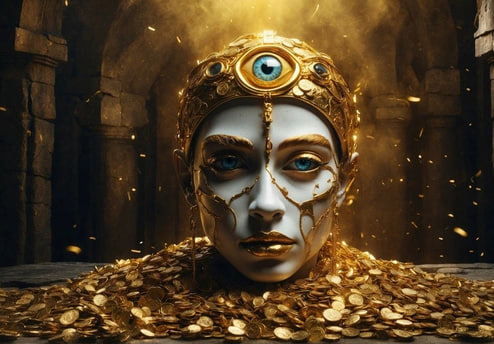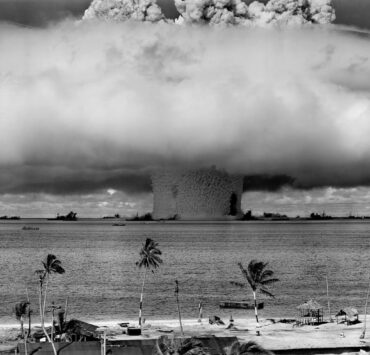The Seven Deadly Sins

Abel Merawi is from Addis Ababa. He is an English…
Originally published on the author’s website in October, 2019
Last night I invented a new pleasure, and as I was giving it the first trial, an angel and a devil came rushing toward my house. They met at my door and fought with each other over my newly created pleasure. One was crying, “it is a sin!”— the other, “it is a virtue!” This is how Kahlil Gibran portrays the constant mental battle of good and evil in his acclaimed work, ‘The Madman.’ This is the mind boggling dilemma each of us must endure in our daily lives. This everlasting battle is, as Shakespeare in ‘Hamlet,’ puts it:
“To be, or not to be,—that is the question:—
Whether ’tis nobler in the mind to suffer
The slings and arrows of outrageous fortune
Or to take arms against a sea of troubles …”
While going through the classical writings, which we currently may presume as ‘a waste of time,’ one finds elaborated discourse regarding ‘The Seven Deadly Sins’. They are: Vanity, Covetousness (greed), Lust, Anger, Gluttony, Envy, and Sloth.
The Seven Sins, having their origin in religious doctrines, had dominated the works of famous writers. John Cassian was the first to introduce them to Europe and Catholic teachings through his work, ‘The Institutes’. They are also presented as a major topic in Chaucer’s ‘Canterbury Tales’ and Dante’s ‘Purgatory’. When we look at the idea from which they emanate, The Seven Sins originate from the thought that abuses or excessive versions of one’s natural facilities or passions are sinful or immoral. These ideas can operate on both personal and social levels for the sins have the potential to harm not just society but also the person practicing them.
The German philosopher, Nietzsche in his work ‘Human – All Too Human’ expresses ‘Excess’ by stating, “The mother of excess is not joy but joylessness.” It is the desire for excess or surplus that drives the human mind into the Seven Sins. Through moderation, the sins can be normal or even admirable traits in any person. Let us treat each sinful act separately and see where it takes us.
Vanity emanates from self-esteem or self-worth. An appreciation and sense of worth is verily useful for existence. But over pride or vanity leads one astray, into a realm of demeaning or belittling perception towards others. It portrays the self as god. It can also blind a person and fill one’s world with hubris leading to ignorance. It is a sort of ignorance that takes root when we consider the self as sage or profoundly wise and close the door to learning.
Covetousness (greed) finds its origin from the human instinct of want. It is normal and admirable to continue and sustain our lives by satisfying our needs and desires. In this lifelong journey, we ought to ask these questions: ‘How much is enough?’ and ‘Upon whose expense am I to satisfy my desires?’ When we lose sight of our path, we desire to possess all by sacrificing others. We begin to chase a phantom which keeps us awake at night as we plot, filled with greed. Such covetousness is infectious to our own mental stability and to those around us.
Lust follows from such greed to own everything. Having a healthy sexual desire is expected of all human beings. It is essential for the survival of the human race and it is a symbolic physical act of declaring love and union with the opposite sex we attaché ourselves to. Yet a sheer physical desire to fornicate with everyone we set our sights to begets lust. Such a desire is an ailment to the person’s mental stability and brings emotional and physical sickness to anyone with whom the lustful crosses path. Bearing in mind how pride begets greed and greed begets lust, we will move onto the other forms of excess.
Continuing with the list of deadly sins, we now deal with Anger. Wrath or anger is an excess display of emotion that takes control of our rational faculty. It is normal, and at times acceptable, to feel disappointment and displeasure in our minds when our dreams are contrary to the reality. This can be adjusted by examining the dire situation and handling it in rational manner – to either alter the situation or accept it and change our perspective. But wrath breeds in the mind of the narcissist who is filled with greed and lust. The one whose blinded by vanity refuses to accept others have equal rights and freedom. A mind filled with wrath does not have the mental setup to face reality and, thus, becomes an agent of distraction to the self and others. Maya Angelou once said: “Bitterness is like cancer. It eats upon the host. But anger is like fire. It burns all clean.”
Gluttony (excessive eating) comes creeping into our mind as we think we own everything. The archetype of gluttony craves to consume excess amount of food and beverage. The American novelist, Peter De Vries (1910 – 1993) wrote, “Gluttony is an emotional escape, a sign something is eating us.” The fear of scarcity overshadows the rationality required to acknowledge when something is adequate or enough. It is normal to eat or drink in order to sustain life, and sometimes to indulge in fine meal and drinks. But gluttony leaves a person in want, never satisfied, and always fearing lack while having excess.
The person who is greedy enough to take possession of something or someone, but not have the righteous means to attain them becomes envious. Envy is a disease that can potentially drive the mind to insanity. The desire to toil and reach the same level as others is a health human desire. However, the envious mind does not have work in his or her vocabulary. The normal desire is substituted by an evil plot to rob others of their possessions. It grows from ignorance of identifying one’s lot and the means necessary to attain it.
Among the Seven Deadly Sins, we are now left with sloth. The extremely lazy human being who doesn’t value hard work is dominated by lethargy. The healthy human being knows the value of rest so as to refresh and start anew. But sloth is a permanent desire to rest and never partake in the activities required to sustain life. It is irrational and incongruous to want ones needs fulfilled but never facilitate the means to attain them. This results in the person becoming a parasite and the people who depend on him to be left unprotected.
I think it is wise to say a few words on the heroes of our time, for they illuminate the values we share as a society. We may ask, who really are our contemporary heroes? Are they not the corrupted who reap fortune by snatching from the destitute of the little they possess? Are they not the tyrants who make false promises to the people and rule not through love but intimidation? Are they not the power craving and bigot leaders who try to extend their exploitation through divide and conquer? Are they not the sluggish business people who do not know hard work but only shortcuts? Are we not praising the merchant who takes pleasure in raising prices and profiting more than the producer? Do we not aspire to become like the so called entrepreneur who makes a fortune by appealing to the dreams and aspirations of the poor only to escape without fulfilling them? The answer to all these rhetorical questions is YES. These villains and scoundrels are heroes because material and money has become our God. We are willing to forgive and forget all as long as the lowlife criminal manages to make a fortune. We put a price tag on everything, even on our values and the precious human life. We have become insanity and stupidity par excellence!
Despite the pessimistic reality I witness, I remain optimistic. This is because we still have some hope for recovery. It was not long ago that we embraced the sins, so some part of us still knows what virtue used to represent. The comfort zone we created is not really comfortable. A sense of shame and discomfort is crucial to change. The process of healing humanity begins with revaluation of values.
What's Your Reaction?
Abel Merawi is from Addis Ababa. He is an English literature teacher, freelance writer/reporter for Ezega.com and an Amharic-English translator and editor. He also writes for www.msingiafrikamagazine.com. You can reach him via: abelmerawi4@gmail.com










